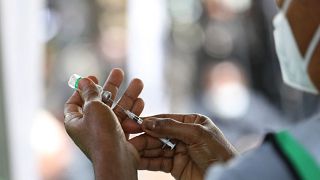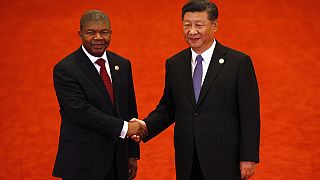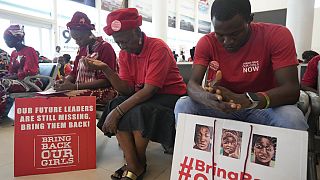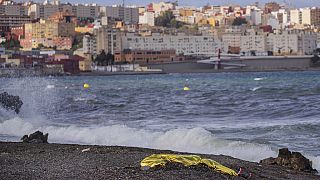Angola
In the Mercado do 30, one of the largest markets in Luanda, many vendors fear being contaminated by covid-19, due to non-compliance in the use of masks and little social distancing.
Those vaccinated have gone to the extent of seeking divine protection before undertaking their daily chores.
Located in the Angolan municipality of Viana, 30 kilometers from the capital Luanda, it is the largest open-air market supplying various products and also brings together thousands of people every day.
The market's main source of income are women, who fill most of this square for trading goods and services.
Despite being aware of the dangers of Covid-19, most of these women go ahead with their duties with little attention to the precautions. Most don't wear face masks and no social distance is maintained.
The almost non-existent physical distance is also a concern for the vendors who, even though they have taken the first dose of the covid-19 vaccine, say they are fearful, but confident in God that he will protect them as they continue with their livelihoods.
The short rains that hit Luanda further complicated the movement of people inside the market, due to the mud and puddles of water in the already narrow streets, pushing vendors and buyers to be in contact.
Already vaccinated, but without any protective mask, we meet Celina Jaúca, who has been selling clothes for ten years at the market and regrets not having managed, since the early hours of the day, to get even one kwanza (Angolan currency) to buy a mask.
"I didn't bring the mask because I forgot it at home plus the vaccine card. I'm really afraid of contagion, I just don't have the money to buy a mask yet," she told Lusa, a local news agency in Angola.
Paula Isaac transformed a wheelbarrow into a mobile stand and there she exhibits various food products that she has been selling in that market, in the southern area of Luanda, for four years.
The 31-year-old vendor said she had already taken the first dose of the vaccine against covid-19, admitting she was also "afraid of contagion" in that market because the disease "is invisible and you can't see who has it.
However, in daily contact with customers, Paula Isaac does not require the presentation of the vaccination card or certificate, as they imposed on her recently when she accompanied her son to the hospital.
The importance of the vaccine against covid-19 was also highlighted by Natália Ngueve, a vegetable seller at the Mercado do 30, who already got her first dose and but still uses a face mask irregularly. She said she is always "distracted" and still "fears" contamination.
"It is only God that has to take care of us and we will deliver everything into his hand (...). Sometimes I wear a mask and other times I don't, just for distraction," an unnamed trader said insisting that it was not compulsory for customers to show their vaccination cards.
Selling cooking oil to support her children is an exercise that Esperança Arminda, 40, has been doing for seven years at the market, where hundreds of buyers flock in search of mainly local products.
Esperança, who has already taken the first dose of the vaccine, believes that despite the daily floods in the market, individual protection measures help to prevent the spread.
"We do have floods, but not contamination, because we are preventing it with the mask and we have already been vaccinated," she said.
The Angolan health authorities have set up a vaccination post against covid-19 in the market, which is being widely been used by vendors, customers and residents in the surrounding area, as Lusa found out.
Angola, just like the rest of the world, has been fighting the pandemic that has spread to all its 18 provinces.
By 18 November, over 8 million doses of vaccine had been administered against the disease.











01:13
AFCON 2023: Nigeria edges past Angola, DR Congo triumphs over Guinea in quarterfinals
01:20
Nigeria, Angola gear towards AFCON quarter-finals kick off
01:00
AFCON 2023: All you need to know on the quater-final matches
00:56
US secretary of state to visit Cape Verde, Ivory Coast, Nigeria and Angola
01:10
Isabel Dos Santos hit with $733M asset freeze
02:21
2023 Biennale of Luanda focuses on education, peace in Africa